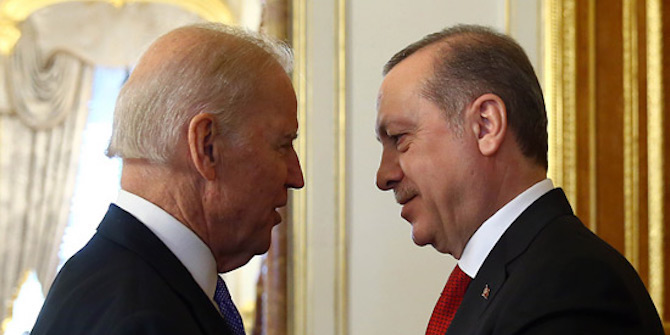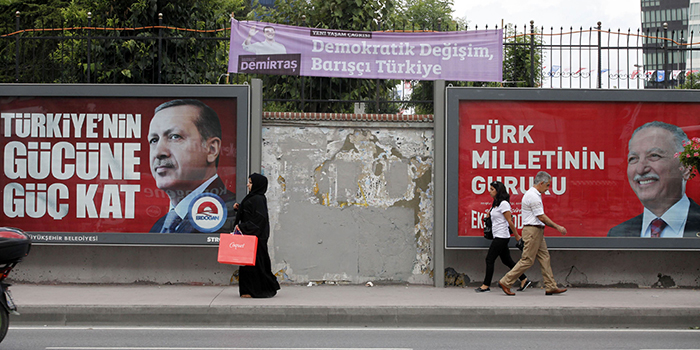by Bugra Susler

The “zero problems with neighbours” policy, once presented as a solution to Turkey’s foreign policy problems, is now mocked as “zero friends” policy, as Turkey’s relationship with several of its neighbours has significantly deteriorated. When considering what went wrong with the policy, it is essential to take into account the failure of Turkish policy makers to anticipate how the Arab uprisings would unfold. Specifically, in the case of the Syrian crisis, the Turkish government made at least two significant miscalculations, which were about the initial stance of the Turkish government towards to the Assad regime and the initial Turkish view on Syrian refugees coming into Turkey. These miscalculations and the deterioration of relations with Syria created a difficult situation for Turkish foreign policy and eventually led to the criticisms declaring the “zero problems with neighbours” policy obsolete.
Turkish policy towards the Middle East during the AKP era prior to the Arab uprisings was based on furthering economic interdependence and establishing closer political ties using cultural affinity. The idea was that Turkey would gain soft power and emerge as a regional leader, which was seen as a stepping-stone to becoming a global actor. To this end, transnational trade was promoted while at the same time culture was used to maintain good relations.
Prior to the onset of turmoil in Syria, Turkish decision makers regarded the relationship with Syria as a success story of the “zero problems with neighbours” policy because the historically tense relations between the two countries had been rapidly improving. When the uprising in Syria began, Turkish decision makers did not want to jeopardise their relationship with the Assad regime and avoided making harsh criticisms. For instance, when the EU was introducing restrictive measures against the Syrian regime and calling for President Assad to step aside, Turkish decision makers were still trying to encourage reforms and refraining from making clear statements. As President Assad did not respond to calls and as the international pressure against the regime mounted, the Turkish government eventually adopted a harsher stance vocally criticising the Syrian regime. Since then, there has been hostility between the Turkish and Syrian governments.
One of the miscalculations at the beginning of the Syrian crisis was that the Turkish government believed they would be able to talk President Assad into implementing reforms, hoping to ease the tension in the country. In addition to this, the strategic value of relations with the Assad regime was high and as a result, they initially avoided appearing vocally critical. Such behaviour revealed one of the key challenges to the “zero-problems with neighbours” policy during the Arab uprisings – the question of how to find a balance between protecting self-interests and supporting democratic movements. In other words, on one hand, the relationship with the Assad regime was strategically important for the Turkish government; but on the other hand, the Turkish government needed to openly criticise the regime due to escalating violence in the country. As one Turkish columnist noted, the friendly relationship between the Syrian and Turkish governments would probably have continued if there had been no uprising or violence. The Turkish government eventually became one of the harshest critics of the regime. However, the hesitation of the decision makers to criticise the regime in the beginning showed the dilemma that they faced and one of the weaknesses of the “zero problems with neighbours policy”.
Another miscalculation about the Syrian crisis was that the Turkish government believed President Assad would soon leave and that the crisis would not last so long, turning into a complex civil war. This had consequences particularly with regard to the issue of Syrian refugees. Turkey kept its borders open to Syrians fleeing conflict and as of 2016 there are over 2.5 million Syrian refugees in Turkey. Until the recent €3 billion refugee deal between Turkey and the EU, there was great resentment from the Turkish side that the EU and the West were not helping Turkey as much as they should. For instance, the Turkish PM often stated that the whole world was merely a spectator while the Turkish government spent billions of dollars on Syrian refugees. However, according to an EU diplomat I interviewed as a part of my research, in the beginning of the crisis in Syria when the number of Syrian refugees in Turkey did not exceed 20-30 thousand, the EU did offer financial support but the Turkish government turned it down. This was a missed opportunity because it could have potentially helped the Turkish government deal with the problem more effectively before it got out of control. The official reason for rejecting the offer was that EU would have transferred the money through international NGOs and UN organisations that it was working with but the Turkish government was not so keen to register them. According to a retired officer who worked at the UN High Commissioner for Refugees (UNHCR), the Turkish government essentially said, “Thank you but we have the capacity to deal with this”. In reality, the fundamental reason why the Turkish government turned down the offer was that it thought the humanitarian crisis would soon be over and President Assad would be removed from power, similarly to Gaddafi in Libya. The Turkish government would have then ideally taken the credit for hosting Syrians without needing any support. Back then the issue of Syrian refugees was a smaller problem. It has now gotten out of hand and become an issue that future governments in Turkey will also most likely have to address.
In conclusion, the Turkish government did not anticipate the crisis to last for so long and to become a major foreign policy issue. Needless to say, the relationship that Turkey has today with its Middle Eastern neighbours is far from the ideal of having “zero” problems. When examining the merits and the problems of the policy, it is important to also consider the way in which miscalculations play a role.

Bugra Susler is a PhD Candidate in the International Relations Department at LSE. His research is on Turkish foreign policy and Turkey-EU relations during the Arab Spring. He holds an MSc in Politics and Government in the EU from LSE and a BSc in Politics from the University of Bristol. As a Teaching Assistant, he has taught courses on Foreign Policy Analysis, emerging powers and Africa, and the diplomacy of war.






